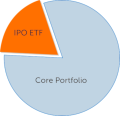For years, the VC community bashed the IPO market and its public investors as being too myopic and tied to old-fashioned metrics to appreciate the inflated valuations of giant technology unicorns in which the VCs had invested billions.
Recent events are proving the public market correct. Absent a willingness to accept the realistic valuations offered by public investors, the once high-flying technology unicorns and smaller private companies are now finding that their avenues of liquidity are shrinking as the unicorn bubble deflates.
This week Airbnb (ABNB.RC), which had spurned the IPO market for many years and briefly flirted with the idea of a direct listing, went hat in hand to the high yield market for a $1 billion loan to finance operations. Private equity lenders Silver Lake and Sixth Street Partners extracted a 10%+ interest rate and warrants that they can convert at an $18 billion valuation. Not too long ago, Airbnb was aiming for a $50 billion valuation.
WeWork (WE), whose planned 2019 IPO and $47 billion private valuation fell apart when investors got a look at the huge losses detailed in its prospectus, got more bad news this week when its main backer SoftBank backed out of a $3 billion share buyout of existing shareholders.
The implosions of these two high profile private companies are just the tip of the iceberg. Other private companies, including restaurant software developer Toast (TOAST.RC), vacation home rental platform Vacasa (VCSA.RC), and luggage maker Away announced massive layoffs of staff.
As we have long said, the IPO market may be old fashioned, but it efficiently balances the need of issuers to raise money with the willingness of investors to buy shares. The IPO market will reopen to private companies when they and their VC backers at long last capitulate to realistic valuations.



